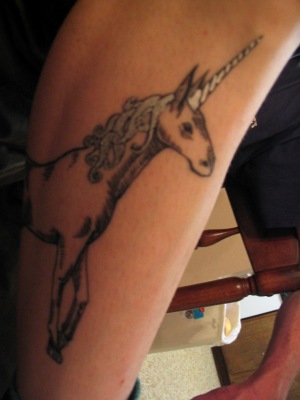The thematic breadth of
William Vollmann is simply stunning. I first read
The Royal Family (about which i wrote far too little. the exegesis on the corruption and screwed-up-ness of the penal bail system alone is fantastic), which is a novel set in SF relating the downfall of a private investigator in love with a rich and suicidal Korean woman while at the same time falling in love and chattledom with a nearly-mythical prostitute/pimp in the streets of the Tenderloin. Then there's his most recent work,
Europe Central, an incredibly erudite work about various aspects of the USSR and Germany during the years anteceding and following WWII. It manages to portray large portions of the war through the lens of classical music! (the main character is Dmitri Shostakovich) The entire thing is meticulously researched, with footnotes and sources for each historical reference. It's also about a zillion pages.
So, my experience has been that Vollmann is often a bit difficult to approach, but has always been rewarding, and so i had confidence when i picked up one of his earlier works,
The Rainbow Stories out at the
Friends of the Library Shop at Fort Mason. Written in the late 1980s, The Rainbow Stories is a collection of short writings mostly about various marginal groups or scenes in San Francisco during the 80s.

The story which asks the most of the reader is "The White Knights", where Vollmann actually became (or simply was?) friends with a gang of white-supremacist skinheads named "The SF Nazi Skinz". I believe this is them on the cover of the book, sig-heiling away, skateboards in tow. Vollmann basically hung out with them and asked about their various life stories, and did an admirable job of writing them down without too much editorializing or judgement. He follows a few of them in particular, getting the story of how they became a skinhead, some stories of their life now, and the seemingly inevitable dissolution to jail or death. Clearly these people lived sad, horribly fucked-up lives of misery and viciousness. But Vollmann's take seems to be something like "we all choose our fucked-up-ness in this world. the skinheads have chosen violence and squalor, while the commuters on the bus have chosen to live without souls and work for the man". - or something.
The skinhead story becomes truly amazing when held against the next one, in which Vollmann during this same period was also becoming a friend (and client) of the SF prostitutes, most of whom are distinctly not white. He describes what it's like to smell the hair of one particular black girl, whom he knows the skinheads personally hate and often talk about beating up. He asks the girl, "what do you think of those skinheads?" and she replies "i don't like 'em. no, i don't." In a later story, Vollmann has a korean girlfriend, and the girlfriend is throwing him a birthday party, and it's mostly her middle-class korean friends over, and Vollmann also invites two bootwomen from the Skinz (apparently female skinheads are "bootwomen") to the party, and then the girlfriend's wallet goes missing.
Along the way, there is a rather overly long and bookish dramatization of the bible story of Shadrach, Meshach, and Abednego, a story about a leader of Thugs on Thuggee and his supernatural servant (the devil), an interview with a man who blew up an occupied department store in ireland, a typically personal and human exploration of the homeless of golden gate park and a fictional-but-possible story of a murderer preying on them (based on real events), and finally a portrait of our much-beloved Survival Research Labs. (makers of large destructive robots which fight each other in imitation of human sexuality, and pretty much the genesis of the much tamer robot-wars industry we have today)
Basically, he wears a lot of hats, most of which are hats i would have a lot of difficult wearing, and many of which are hats i wouldn't even want to be in the same room with, and it's well-written and amazing.
 Written very late in her life (1991), when Carter was about 50, it's the story of identical twin sisters reflecting back on their life as burlesque and movie starlets from the vantage point of sixty or seventy. The title refers to the saying (which i hadn't fully grappled with previously) "It's a wise child that knows it's own father", so you can imagine that there's a fair amount of paternity hijinks, and possibly even maternity too. As always, Carter is frank and charming on the topics of sex, and manages to weave an integrated tale of sexuality from childhood through septagenarianhood. The word "menarchy" appears, you may be sure. I can't recommend this story enough, it's fantastic.
Written very late in her life (1991), when Carter was about 50, it's the story of identical twin sisters reflecting back on their life as burlesque and movie starlets from the vantage point of sixty or seventy. The title refers to the saying (which i hadn't fully grappled with previously) "It's a wise child that knows it's own father", so you can imagine that there's a fair amount of paternity hijinks, and possibly even maternity too. As always, Carter is frank and charming on the topics of sex, and manages to weave an integrated tale of sexuality from childhood through septagenarianhood. The word "menarchy" appears, you may be sure. I can't recommend this story enough, it's fantastic.






